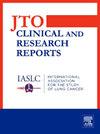Combined RET and MEK Inhibition as a Treatment for RET Fusion-Positive NSCLC With Acquired BRAF Fusion: A Case Report
IF 3
Q2 ONCOLOGY
引用次数: 0
Abstract
RET fusions are present in 1% to 2% of NSCLCs. Although RET inhibitors like selpercatinib are effective, resistance inevitably develops. We present the case of a 28-year-old female with recurrent NSCLC and a CCDC6::RET fusion treated with selpercatinib. Testing at the time of progression revealed a new SKAP2::BRAF fusion. She was then treated with a combination of selpercatinib and trametinib, which led to a likely partial response, despite the combination demonstrating side effects. This case report details the first known instance of NSCLC with a RET fusion developing resistance by means of a BRAF fusion, treated with combined RET and MEK inhibition.
RET和MEK联合抑制治疗RET融合阳性且伴有获得性BRAF融合的NSCLC:病例报告
1%至2%的NSCLC存在RET融合。尽管像色瑞帕替尼这样的RET抑制剂很有效,但不可避免地会产生耐药性。我们报告了一例28岁女性患者的病例,该患者患有复发性NSCLC,并伴有CCDC6::RET融合,曾接受过舍培卡尼治疗。病情恶化时的检测发现了新的 SKAP2::BRAF 融合。随后,她接受了塞培卡替尼和曲美替尼的联合治疗,尽管联合治疗出现了副作用,但她很可能获得了部分应答。本病例报告详细介绍了第一例已知的RET融合的NSCLC患者通过BRAF融合产生耐药性,并接受RET和MEK联合抑制治疗的病例。
本文章由计算机程序翻译,如有差异,请以英文原文为准。
求助全文
约1分钟内获得全文
求助全文
来源期刊

JTO Clinical and Research Reports
Medicine-Oncology
CiteScore
4.20
自引率
0.00%
发文量
145
审稿时长
19 weeks
 求助内容:
求助内容: 应助结果提醒方式:
应助结果提醒方式:


